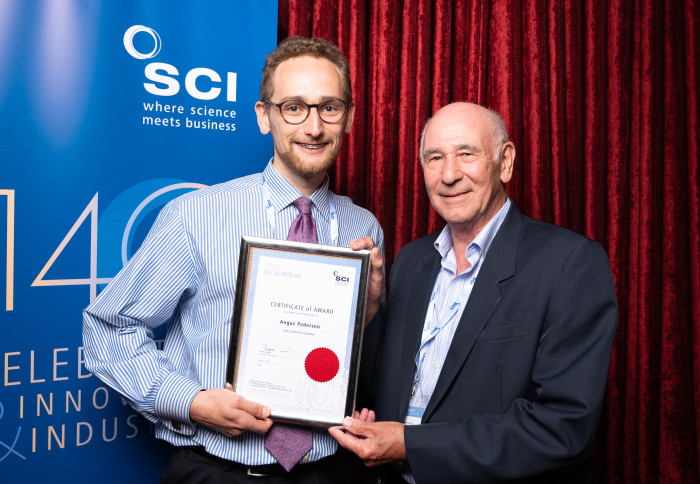Materials student awarded prestigious SCI scholarship

Mr Angus Pedersen, a research postgraduate student in the Department of Materials, has been awarded an SCI scholarship.
The scholarship, worth £5,000, will cover the remaining period of his PhD research in atomic Fe electrocatalysts for fuel cells and electrolysers.
The SCI Scholars Fund was established in 1920 by the Society of Chemical Industry (SCI). Each year, SCI provides scholarships and bursaries to early career scientists including opportunities to attend or present at an international conference.
Commenting on the scholarship, Mr Pedersen said:
“I’m now in my 3rd year of my PhD in the EPSRC-funded Advanced Characterisation of Materials Centre for Doctoral Training (CDT ACM), under the supervision of Prof Magda Titirici and Dr Ifan Stephens.
The funding and support offered by my SCI Scholarship, in addition to the ACM CDT, will provide a valuable resource to help me pursue my studies Mr Angus Pedersen
The funding and support offered by my SCI Scholarship, in addition to the ACM CDT, will provide a valuable resource to help me pursue my studies.
This has already allowed me to present at the International Carbon Conference 2022 at Imperial College London this Summer, which was also supported by the SCI Carbon interest group.
From this conference, I was able to meet new contacts and collaborators and explore new research fields."
Exciting research ahead
Mr Pedersen's research focuses on developing cheap and sustainable electrocatalysts based on Iron, which could lead to more sustainable ways of producing energy in the future. He works in both Departments of Materials and Chemical Engineering to complete research.
Mr Pedersen said: "Ultimately, I hope that the findings of my PhD will allow me to develop cheap and sustainable electrocatalysts, which can replace current commercially employed expensive Pt-alloys as the oxygen reduction catalyst in proton exchange membrane fuel cells.
Excitingly, the same electrocatalysts we are developing in the Titirici group and Stephens group can also be used to electrochemically convert CO2 to value-added products such as CO.
We are moving towards developing the next generation of catalysts which we hope will eventually lead to oxygen reduction performance beyond that of Platinum, while for CO2 reduction they could lead to higher value hydrocarbon products.”
About SCI
SCI is an inclusive, inter-disciplinary forum connecting scientists and business people to advance the commercial application of chemistry and related sciences for public benefit. Originally established in 1881, SCI is a registered charity with members in over 90 countries.
This article was adapted from a press release by the SCI.
Photo credit: SCI/Andrew Lunn
Article text (excluding photos or graphics) © Imperial College London.
Photos and graphics subject to third party copyright used with permission or © Imperial College London.
Reporter
Kayleigh Brewer
Department of Materials